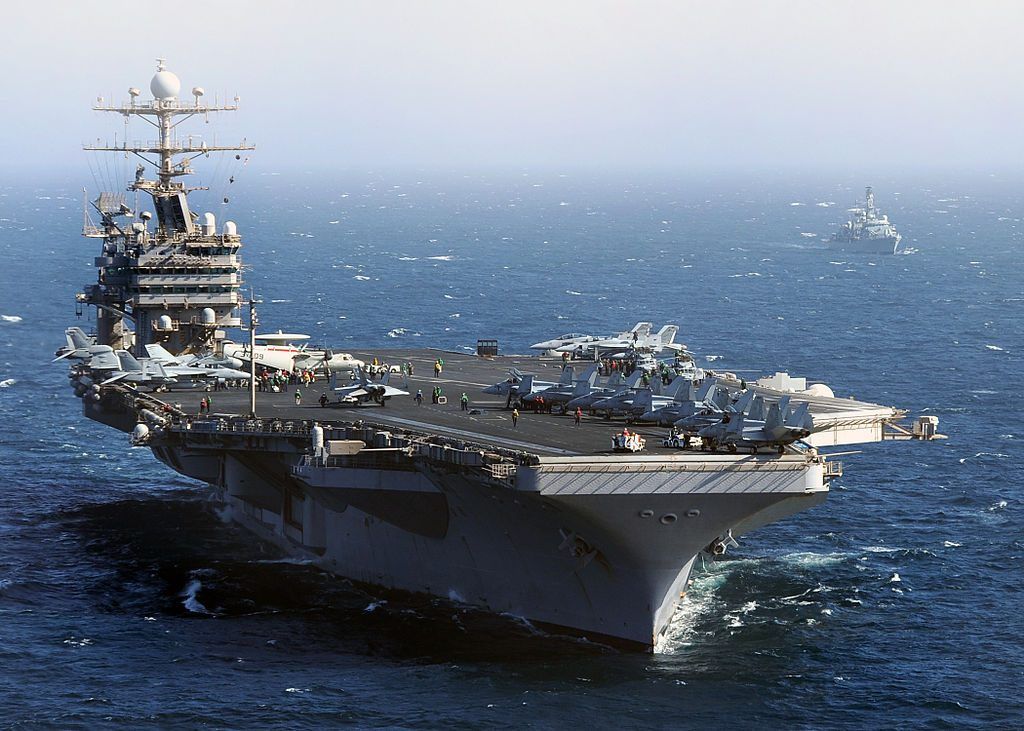The Trump administration’s maximum pressure campaign: A prelude to war with Iran?
By Dina Esfandiary | May 6, 2019
 The USS Abraham Lincoln on a 2012 mission in the Persian Gulf. US Navy photo by Mass Communication Specialist 3rd Class Jerine Lee.
The USS Abraham Lincoln on a 2012 mission in the Persian Gulf. US Navy photo by Mass Communication Specialist 3rd Class Jerine Lee.
The Trump administration’s “maximum pressure” campaign on Iran has picked up pace. Last month, the administration designated the Revolutionary Guards as a terror organization. Last week, it cancelled waivers from US sanctions that allowed some countries to buy Iranian crude oil, aiming to force Iranian oil exports to zero, and only renewed some of the waivers that allowed foreign countries to engage in civil nuclear cooperation with Iran—key to the functioning of the Iran nuclear deal. This week, the White House stated that a routine deployment of and aircraft carrier strike group to the Persian Gulf was in fact intended to “send a clear and unmistakable message” to Iran.
To date, however, the maximum pressure campaign has failed to change Iranian behavior. In fact, it seems designed to push Iran to leave the deal and set the scene for military confrontation.
When President Trump withdrew the United States from the 2015 nuclear deal with Iran, he re-imposed a wave of unilateral sanctions. These sanctions included prohibitions on the purchase of Iranian oil. But in November 2018, the administration issued waivers to eight countries: China, India, Greece, Italy, Taiwan, Japan, Turkey, and South Korea, who would all be allowed to continue importing Iranian oil for six months, provided they showed significant cuts in their imports. Importantly, though, in issuing these waivers, the administration made a specific stipulation: For the countries buying Iranian oil to benefit from US waivers, the income from these oil sales would have to be funnelled into escrow accounts, to be held for use in the purchase of humanitarian goods. In other words, the money made from oil sales could only be used to buy food and medicine. For example, in December 2018, India and Iran agreed on the exact parameters of the process: India would deposit payments for oil imported from Iran into escrow accounts at five of its banks held by state-run UCO Bank Ltd. Iran would then use that money to purchase humanitarian goods from India.
When Secretary Pompeo announced the end to the US waivers on 15 April, he said it would deprive the Iranian government of a key source of revenue—40 percent of it, to be precise. But the November 2018 US oil waivers had already limited what Iran could do with the money from oil sales, ear-marking it specifically for the purchase of food and medicine. All this additional step did was remove the credit that Iran would have accumulated in each country it sold oil to, to spend on food and medicine. In addition, the administration is reportedly exploring expanding sanctions to target Iranian ability to sell other goods, including petrochemicals, abroad. All these measures clearly go beyond targeting Iranian officials, and now target Iranians directly.
Last week attention turned to the nuclear waivers, which are necessary for the international community to carry out the technical work required for the implementation of Iran’s nuclear agreement with Russia, China, and European countries. That work would convert Iranian nuclear facilities, so they no longer pose a proliferation concern. The waivers also allowed Iran to sell the excess nuclear material that it produces and that poses a proliferation concern to other countries.
The 2015 nuclear agreement, officially known as the Joint Comprehensive Plan of Action (JCPOA), specified that three Iranian facilities—the Fordow enrichment plant, the Arak heavy water reactor, and the Bushehr nuclear power plant—would be converted with the help of foreign countries. The nuclear deal requires both Fordow and Arak to be converted into research facilities; also, Iran needs waivers to continue buying fuel from Russia for the Bushehr plant. There was no fact-based argument in favour of not renewing the nuclear waivers; they enable foreign suppliers and engineers both to work to convert the Iranian facilities so they can’t be used in a nuclear weapons program, and to have insight into Iranian civilian nuclear efforts because of their presence on the ground and access to the facilities.
On 3 May, Assistant Secretary of State Christopher Ford announced the renewal of the waivers allowing work to continue on Arak, Fordow, and Bushehr facilities, but only for 90 days, rather than the previous 180. The decision to renew the waivers is welcome to those who hope all remaining parties to the nuclear deal will continue to implement it. But the engineers involved in converting Iranian facilities will not be able to make significant progress in such a short time. This short extension move effectively kicks the can down the road for 90 days.
Apparently, the Trump administration did not want to risk looking lenient by renewing all nuclear waivers and so revoked two. The first allowed Iran to ship excess heavy-water to Oman, while the second permitted it to ship excess enriched uranium—any amount above a 300-kilogram limit—in exchange for natural uranium. The JCPOA states that excess enriched uranium can be either down-blended (converting uranium enriched to anything above 3.5 percent back to low enriched uranium) or sold. The US decision prevents Iran from selling the excess enriched uranium, only leaving Tehran with the option of down-blending it.
The nuclear deal doesn’t address how Tehran should stay below the 130-ton heavy-water limit contained in the agreement. Ensuring Iran remains below the limit of heavy-water allowed by the JCPOA is essential to ensuring that Iran does not retain a second path to a nuclear weapon. Plutonium—produced in the operation of a heavy water plant—is the second raw material that could be used to produce a nuclear weapon. As such, the deal doesn’t force any party to the agreement or third party to help Iran get the excess heavy water out. But removing the option for other countries to take the excess heavy water seems designed to make it harder for Iran to comply with the limit contained in the JCPOA.
It is unclear what the Trump administration aims to achieve with its “maximum pressure” campaign. Ceasing the oil waivers only restricts Iran’s ability to purchase much needed humanitarian goods for a population that Secretary Pompeo repeatedly states the administration “stands with.” The renewal of the waivers allowing work to continue on Iran’s nuclear facilities is wise, but the shortening of the timeframe will mean that the administration will merely have to revisit the issue in 90 days. The work contemplated under the Iran nuclear deal can’t possibly be completed within three months. What’s more, far from “tightening restrictions on Iran’s program,” preventing it from shipping or selling excess nuclear material abroad seems designed to interfere with Iran’s efforts to implement its commitments under the JCPOA. Reframing a routine deployment of the USS Abraham Lincoln strike force to the region only serves to unnecessarily heighten tensions and foster the potential for miscalculation. The only reason to do any of this is to push Iran into a corner, paving the way toward military confrontation—something few want because it will achieve little.
Together, we make the world safer.
The Bulletin elevates expert voices above the noise. But as an independent nonprofit organization, our operations depend on the support of readers like you. Help us continue to deliver quality journalism that holds leaders accountable. Your support of our work at any level is important. In return, we promise our coverage will be understandable, influential, vigilant, solution-oriented, and fair-minded. Together we can make a difference.
Topics: Analysis, Nuclear Weapons, The Iranian problem
















Bolton’s probably chomping at the bit for a war, has been for years, and look at how the White House reacted to Venezuela. Although it might turn out to be posturing, that will likely fall apart.
It only takes an incident, a military one most likely, to set off a chain of events leading to war.
Deja-vu the Gulf of Tonkin Incident (the ‘Casus Belli’ for the Vietnam War) which turned out to be bogus or a “False flag’ operation.
In the Persian Gulf we have MBS– the guy who had Kashoggi butchered, the guy who had 32 beheaded last week, the guy who’d LOVE to have the US at war with Iran, right there –and no doubt in my mind–planning such a false-flag op to spark that war.
Now that the Russia thing seems to have gone away, he wants his war. War is good for reelection. It really is a primitive strategy like that. Learning from history – Iraq and Afghanistan come to mind – is a complete no go in this new world of fake news and rampant populism.
However, I’m afraid we have to blame the voters. Here in Europe, in the US, in Brazil – they knew exactly what they were voting for. Now we have narcissistic madmen in command and I’m very afraid it won’t end well.
> However, I’m afraid we have to blame the voters. Here in Europe,
> in the US, in Brazil – they knew exactly what they were voting for.
> Now we have narcissistic madmen in command and I’m very afraid
> it won’t end well.
Odd that you don’t mention the country directly involved where all this applies even more…
No need to be scared, Donald J has everything under control
Wag the dog.
The US needs to realize that Iran and Russia have a mutual defense treaty. You attack Iran and you attack Russia.
What is “routine” about warships being positioned off the coast of Iran? Routine is a term of propaganda. Imagine if Iran positioned a naval armada off of New York. The JCPoA deal which the Washington hawks reneged on was working. Yukiya Amano, the Director of the UN’s International Atomic Energy Agency, said Iran was “subject to the world’s most robust verification regime” and after multiple inspections Iran was in compliance.
Any country that makes the United States lose face, always faces the prospect of revenge from the US. The whole objective here is to isolate Iran, with the tacit support of Sunni Arab states, and our ‘cop on the beat’, Israel. Always spoiling for war, the United States will, sooner or later, compel Iran to engage the US on the battle field. The result? More chaos in the Middle East, Iranian terrorist retaliation and more dead bodies; American service personnel, innocent citizens, traumatized children. I suggest that the families of Mike Pompeo, Donald J. Trump and John Bolton, sign up… Read more »
A war with Iran could cause them to close the Straits of Hormuz, which would lead to a catastrophic oil shortage. Thousands of lives would be lost, too.
Sounds like prelude to world war III
Yes, it would seem obvious where China would stand in such a confrontation. Is Iran not the terminus of its Road and Belt initiative? End of the world around the corner.
If there’s one thing for which the neo-fascists are itching, it’s another war.
If you look at the world Theater. It seems this is the setting up of horror to come!
The JCPOA was negotiated within the framework of the Security Council between its five permanent members plus the EU to stop Iran from becoming a nuclear weapons state. Inherently, nuclear weapons proliferation is a global threat that can only be effectively addressed thru the Security Council. It is not a bilateral issue between the U.S. and Iran. There is no “deal” possible between the U.S. and Iran other than steps towards the normalization of relations. Iran does not threaten U.S. national security interests as long as Iran continues to comply with JCPOA. Non-nuclear issues that the Trump Administration claims are… Read more »